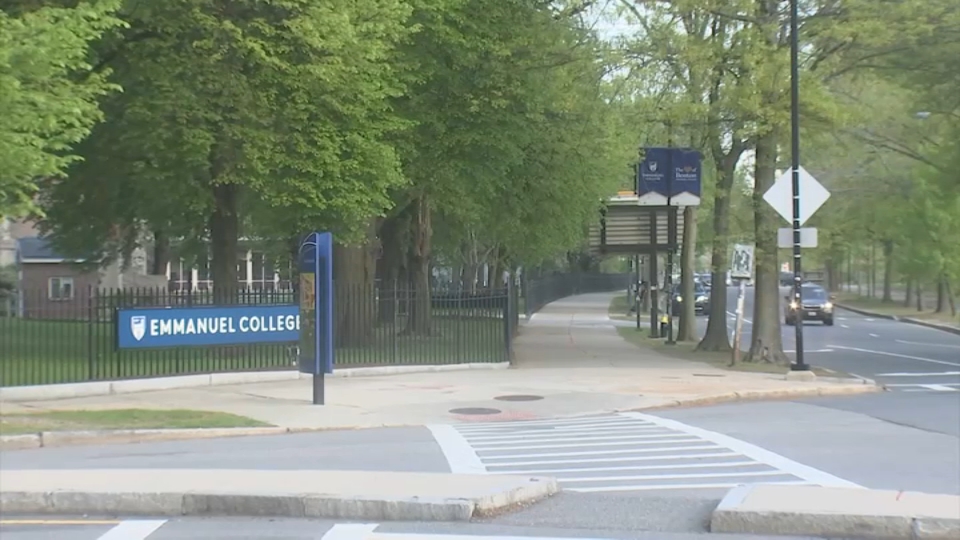College Admissions Scandal: Staffer Arrested for Sex Trafficking
Emmanuel College Admissions Staffer Arrested in Sex Trafficking Scandal
A Trust Betrayed: Introduction to the Shocking Accusations
Imagine sending your child off to college, full of hopes and dreams for their future. Now, imagine the chilling realization that someone within the very institution entrusted with their care allegedly preyed on them. That's the gut-wrenching scenario unfolding at Emmanuel College in Boston, where a member of the admissions department stands accused of the unthinkable.
Jacob Henriques, 29, an assistant admissions director, was arrested on Friday evening, facing charges of attempted sex trafficking of a minor. The allegations are deeply disturbing, suggesting a systematic abuse of power and a blatant disregard for the safety and well-being of vulnerable young people applying to the school. But how did this alleged exploitation occur? What measures are in place to prevent such horrifying incidents? Let's delve into the details of this unfolding scandal.
The Charges: Attempted Sex Trafficking and Abuse of Power
The U.S. Attorney’s office in Massachusetts paints a grim picture. Henriques allegedly used his position in the admissions department to access the personal information of students and applicants. This access, normally a tool for assisting potential students, was allegedly weaponized for predatory purposes. How could someone misuse their position like this?
The Victims: A Pattern of Alleged Exploitation
Prosecutors allege that Henriques contacted at least four victims, extending offers of payment for "some fun." One of these victims was a 17-year-old prospective student, a minor whose trust he allegedly violated. This begs the question: are there more victims out there? The full extent of this alleged misconduct is still under investigation, and the ripple effects of this scandal are sure to be far-reaching.
Pornography and Exploitation: Further Details of the Allegations
The allegations don't stop at offering payment for "fun." Henriques is also accused of providing pornography and sending pornographic videos and images to some of the victims, including the underage girl. This adds another layer of depravity to the charges, suggesting a deliberate attempt to groom and exploit vulnerable individuals. The impact on these victims must be devastating.
The Tour and the Data: Alleged Premeditation
Before giving a school tour to the 17-year-old girl around April 25th, Henriques allegedly reviewed her tour registration form. This suggests a premeditated act, a calculated effort to identify and target a potential victim. It's a chilling detail that underscores the alleged abuse of trust and power at the heart of this case. What security measures were in place? And how were they circumvented?
Emmanuel College's Response: Awaiting Details
As of the initial reports, Emmanuel College has not released a detailed statement regarding the arrest and allegations. The college's response will be crucial in determining the level of accountability and the steps taken to ensure the safety of current and future students. One can only hope they are taking swift and decisive action to address this crisis. This silence is deafening. What are they waiting for?
Legal Consequences: What Henriques Faces
The charge of attempted sex trafficking of a minor carries significant legal consequences. Henriques faces the potential for lengthy prison sentences and a lifetime of shame. The legal process will likely be lengthy and complex, but the pursuit of justice is paramount.
Protecting Students: A Call for Stronger Safeguards
This case highlights the urgent need for stronger safeguards to protect students and applicants from exploitation. Colleges and universities must implement robust background checks, enhance cybersecurity measures, and provide thorough training to staff on ethical conduct and responsible use of personal information. Is your college doing enough?
H3: Enhanced Background Checks
Comprehensive background checks should be conducted on all employees who have access to student information. This includes not only criminal history but also any past instances of misconduct or allegations of abuse. It's like checking the foundation of a house before you buy it - essential for peace of mind.
H3: Cybersecurity and Data Protection
Colleges must invest in robust cybersecurity measures to protect student data from unauthorized access. This includes encryption, firewalls, and regular security audits. It's like building a fortress around sensitive information.
H3: Ethical Training and Awareness Programs
Regular training programs should be implemented to educate staff on ethical conduct, responsible use of personal information, and the reporting of suspected misconduct. This is about fostering a culture of accountability and respect.
The Impact on Applicants: Fear and Distrust
This scandal is likely to instill fear and distrust among prospective students and their families. The idea that someone in a position of authority could exploit their vulnerability is deeply unsettling. Rebuilding that trust will be a long and arduous process. How can colleges regain the confidence of applicants?
H3: Transparency and Communication
Open and honest communication is essential. Colleges must be transparent about their safety measures and their commitment to protecting students. It's about building bridges of trust through honesty.
H3: Support Resources and Counseling
Providing readily available support resources and counseling services for applicants and students who may be affected by this scandal is crucial. It's like offering a helping hand in a time of need.
Beyond Emmanuel College: A Systemic Problem?
While this case involves Emmanuel College, it raises broader concerns about the potential for exploitation within educational institutions. Is this an isolated incident, or does it reflect a more systemic problem? It's a question that deserves serious consideration. How many other institutions are vulnerable to this type of abuse?
The Media's Role: Responsible Reporting
The media plays a crucial role in reporting on this scandal responsibly and ethically. It's important to avoid sensationalism and to focus on the facts while respecting the privacy of the victims. The media should act as a watchdog, not a tabloid. It's a balancing act between informing the public and protecting the vulnerable.
Moving Forward: Lessons Learned
This case serves as a stark reminder of the need for vigilance and accountability within educational institutions. By learning from this experience, colleges and universities can take proactive steps to protect students and applicants from exploitation. It's time to turn this tragedy into a catalyst for change.
The Fight Against Sex Trafficking: A Collective Responsibility
Ultimately, combating sex trafficking requires a collective effort. It's a problem that transcends institutional boundaries and demands a coordinated response from law enforcement, educators, and the community as a whole. We all have a role to play in protecting vulnerable individuals from exploitation. Are you doing your part?
Conclusion: The Urgent Need for Change
The accusations against Jacob Henriques are deeply disturbing, highlighting a profound breach of trust and a potential systemic issue within higher education. The safety and well-being of students and applicants must be paramount. This scandal serves as a wake-up call, urging colleges and universities to strengthen their safeguards, enhance cybersecurity measures, and foster a culture of accountability. Only through these concerted efforts can we hope to prevent such tragedies from happening again. The future of our students depends on it.
Frequently Asked Questions (FAQs)
- What immediate steps should colleges take after such an incident?
Colleges should immediately launch a thorough internal investigation, cooperate fully with law enforcement, and offer support services to affected students and applicants. They must also review and strengthen their existing safety protocols.
- How can parents protect their children from similar situations during the college application process?
Parents should actively discuss online safety with their children, encourage open communication about any uncomfortable interactions, and research the safety protocols of the colleges their children are considering.
- What legal resources are available for victims of attempted sex trafficking?
Victims have access to a range of legal resources, including victim advocacy groups, pro bono attorneys, and law enforcement agencies specializing in sex trafficking cases. They should seek immediate legal counsel to understand their rights and options.
- What role does social media play in these types of crimes, and how can it be addressed?
Social media can be exploited by predators to groom and contact victims. Platforms must enhance their monitoring and reporting mechanisms, while users should be vigilant about their online presence and privacy settings.
- How can colleges foster a culture of reporting and accountability among students and staff?
Colleges should establish anonymous reporting mechanisms, provide clear guidelines on ethical conduct, and actively promote a culture where students and staff feel empowered to report any suspected misconduct without fear of retaliation.

